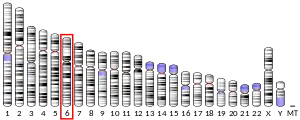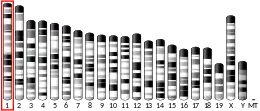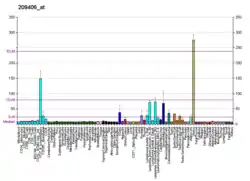BAG2
BAG family molecular chaperone regulator 2 is a protein that in humans is encoded by the BAG2 gene.[5][6]
BAG proteins compete with Hip for binding to the Hsc70/Hsp70 ATPase domain and promote substrate release. All the BAG proteins have an approximately 45-amino acid BAG domain near the C terminus but differ markedly in their N-terminal regions. The predicted BAG2 protein contains 211 amino acids. The BAG domains of BAG1, BAG2, and BAG3 interact specifically with the Hsc70 ATPase domain in vitro and in mammalian cells. All 3 proteins bind with high affinity to the ATPase domain of Hsc70 and inhibit its chaperone activity in a Hip-repressible manner.[6]
References
- GRCh38: Ensembl release 89: ENSG00000112208 - Ensembl, May 2017
- GRCm38: Ensembl release 89: ENSMUSG00000042215 - Ensembl, May 2017
- "Human PubMed Reference:". National Center for Biotechnology Information, U.S. National Library of Medicine.
- "Mouse PubMed Reference:". National Center for Biotechnology Information, U.S. National Library of Medicine.
- Takayama S, Xie Z, Reed JC (Feb 1999). "An evolutionarily conserved family of Hsp70/Hsc70 molecular chaperone regulators". J Biol Chem. 274 (2): 781–6. doi:10.1074/jbc.274.2.781. PMID 9873016.
- "Entrez Gene: BAG2 BCL2-associated athanogene 2".
External links
- Human BAG2 genome location and BAG2 gene details page in the UCSC Genome Browser.
Further reading
- Halse R, Rochford JJ, McCormack JG, et al. (1999). "Control of glycogen synthesis in cultured human muscle cells". J. Biol. Chem. 274 (2): 776–80. doi:10.1074/jbc.274.2.776. PMID 9873015.
- Hartley JL, Temple GF, Brasch MA (2001). "DNA cloning using in vitro site-specific recombination". Genome Res. 10 (11): 1788–95. doi:10.1101/gr.143000. PMC 310948. PMID 11076863.
- Wiemann S, Weil B, Wellenreuther R, et al. (2001). "Toward a catalog of human genes and proteins: sequencing and analysis of 500 novel complete protein coding human cDNAs". Genome Res. 11 (3): 422–35. doi:10.1101/gr.GR1547R. PMC 311072. PMID 11230166.
- Simpson JC, Wellenreuther R, Poustka A, et al. (2001). "Systematic subcellular localization of novel proteins identified by large-scale cDNA sequencing". EMBO Rep. 1 (3): 287–92. doi:10.1093/embo-reports/kvd058. PMC 1083732. PMID 11256614.
- Mungall AJ, Palmer SA, Sims SK, et al. (2003). "The DNA sequence and analysis of human chromosome 6". Nature. 425 (6960): 805–11. Bibcode:2003Natur.425..805M. doi:10.1038/nature02055. PMID 14574404.
- Ota T, Suzuki Y, Nishikawa T, et al. (2004). "Complete sequencing and characterization of 21,243 full-length human cDNAs". Nat. Genet. 36 (1): 40–5. doi:10.1038/ng1285. PMID 14702039.
- Bouwmeester T, Bauch A, Ruffner H, et al. (2004). "A physical and functional map of the human TNF-alpha/NF-kappa B signal transduction pathway". Nat. Cell Biol. 6 (2): 97–105. doi:10.1038/ncb1086. PMID 14743216. S2CID 11683986.
- Ueda K, Kosako H, Fukui Y, Hattori S (2004). "Proteomic identification of Bcl2-associated athanogene 2 as a novel MAPK-activated protein kinase 2 substrate". J. Biol. Chem. 279 (40): 41815–21. doi:10.1074/jbc.M406049200. PMID 15271996.
- Gerhard DS, Wagner L, Feingold EA, et al. (2004). "The status, quality, and expansion of the NIH full-length cDNA project: the Mammalian Gene Collection (MGC)". Genome Res. 14 (10B): 2121–7. doi:10.1101/gr.2596504. PMC 528928. PMID 15489334.
- Wiemann S, Arlt D, Huber W, et al. (2004). "From ORFeome to biology: a functional genomics pipeline". Genome Res. 14 (10B): 2136–44. doi:10.1101/gr.2576704. PMC 528930. PMID 15489336.
- Dai Q, Qian SB, Li HH, et al. (2006). "Regulation of the cytoplasmic quality control protein degradation pathway by BAG2". J. Biol. Chem. 280 (46): 38673–81. doi:10.1074/jbc.M507986200. PMID 16169850.
- Arndt V, Daniel C, Nastainczyk W, et al. (2006). "BAG-2 acts as an inhibitor of the chaperone-associated ubiquitin ligase CHIP". Mol. Biol. Cell. 16 (12): 5891–900. doi:10.1091/mbc.E05-07-0660. PMC 1289430. PMID 16207813.
- Mehrle A, Rosenfelder H, Schupp I, et al. (2006). "The LIFEdb database in 2006". Nucleic Acids Res. 34 (Database issue): D415–8. doi:10.1093/nar/gkj139. PMC 1347501. PMID 16381901.
- Ewing RM, Chu P, Elisma F, et al. (2007). "Large-scale mapping of human protein-protein interactions by mass spectrometry". Mol. Syst. Biol. 3 (1): 89. doi:10.1038/msb4100134. PMC 1847948. PMID 17353931.
This article is issued from Wikipedia. The text is licensed under Creative Commons - Attribution - Sharealike. Additional terms may apply for the media files.




